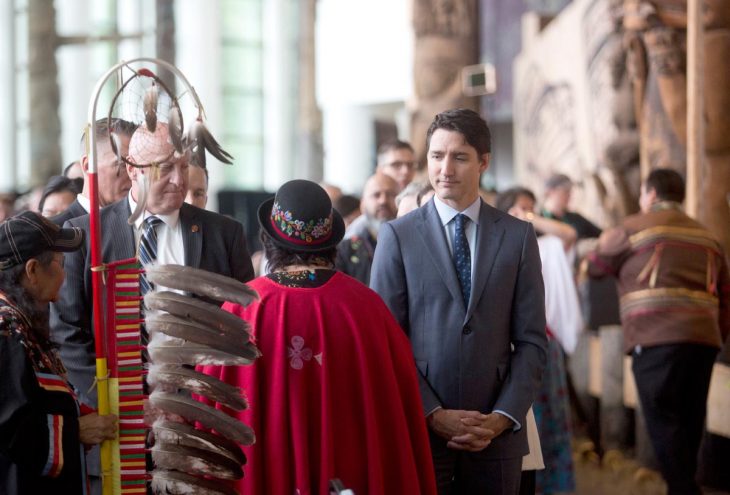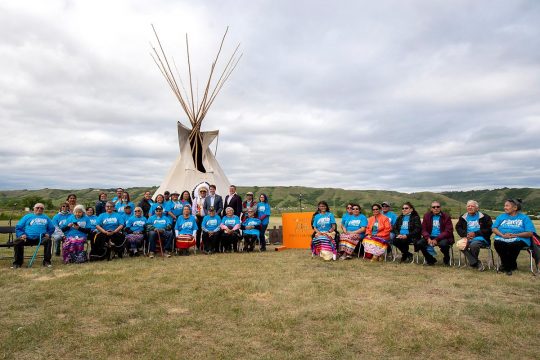After two and a half years of hearings, a Canadian inquiry Monday released its final report on the disappearance and death of hundreds, if not thousands of indigenous women, victims of endemic violence it controversially said amounted to "genocide."
The 1,200-page report was unveiled with Prime Minister Justin Trudeau and victims' families on hand at a ceremony at the Canadian Museum of History, against a backdrop of totems and aboriginal artifacts, framed by a view of parliament across the Ottawa River.
It is the culmination of years of lobbying by native leaders, activists and victims' families seeking to address disproportionate crime levels affecting indigenous women over the past three decades.
According to official estimates, almost 1,200 indigenous women and girls went missing or were killed between 1980 and 2012, out of a community of 1.6 million people.
But inquiry commissioners have suggested the true figure could be many times higher.
Entitled "Reclaiming Power and Place," their report concludes that through "state actions and inactions rooted in colonialism and colonial ideologies," indigenous women and girls were 12 times more likely to experience violence and seven times more likely to be killed than other women in Canada.
The commissioners found that the perpetrators of violence include indigenous and non-indigenous family members and partners, casual acquaintances and serial killers.
But the report went further in linking the deaths to endemic poverty, racism, sexism and other social ills as well as lasting trauma and loss of culture from family separations, and land dispossession traced back to failed attempts by early colonizers to force indigenous people to integrate.
And it called for sweeping changes, detailed in 231 recommendations for improving the security, justice, health and culture of Canada's indigenous people.
"Despite their different circumstances and backgrounds, all of the missing and murdered are connected by economic, social and political marginalization, racism, and misogyny woven into the fabric of Canadian society," said chief commissioner Marion Buller.
"The hard truth is that we live in a country whose laws and institutions perpetuate violations of fundamental rights, amounting to a genocide against indigenous women, girls and 2SLGBTQQIA people," she said -- using an acronym for two-spirit, lesbian, gay, bisexual, transgender, queer, questioning, intersex and asexual.
'Death by a million small cuts'
At the ceremony, which featured aboriginal dances, musical performances and deeply personal stories that brought many to tears, Trudeau acknowledged that Canada had failed indigenous women.
"We will fail you no longer," said Trudeau, who has made reconciliation with Canada's 600 tribes a priority for his government. "It is shameful. It is absolutely unacceptable and it must end."
"You have my word that my government will turn the inquiry's call for justice into real meaningful, indigenous-led action," he added.
The commissioners held 24 hearings across Canada over the past two and a half years and heard from more than 2,000 witnesses, including relatives of missing or murdered women, survivors of violence, experts and officials.
They cited a federal law that allows the government to control most aspects of aboriginal life, a "scooping up" of indigenous children into foster care in the 1960s and abuse at church-run residential schools as examples of historical wrongs that have contributed to the violence in indigenous communities.
"The result has been that many indigenous people have grown up normalized to violence, while Canadian society shows an appalling apathy to addressing the issue," the report said.
The report's recommendations include recognizing more than 60 indigenous languages as official languages of Canada; improving transportation links to remote communities; expanding indigenous courts; stopping the removal of children from families; and creating a task force to assess or reopen cold cases.
Critics said the report's language is too strong, and does not fit the international or legal definitions of genocide.
Buller rejected those views, telling reporters: "Based on the evidence that we heard and read, it was an inescapable conclusion."
"We often think of genocide as the Holocaust and the (mass) killings in Africa and elsewhere, and of course that is genocide and it is a tragedy," she said.
"But the type of genocide we have in Canada is... death by a million small cuts, for generations."






